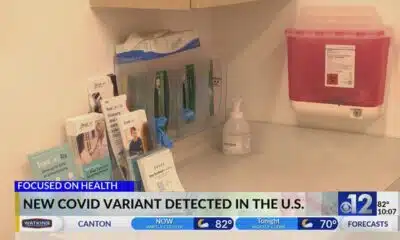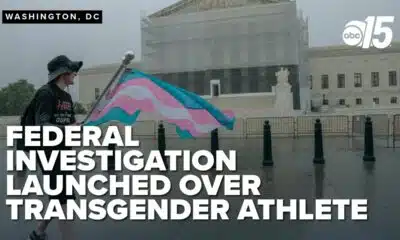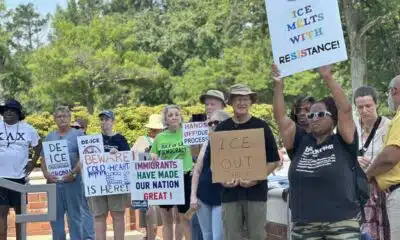Mississippi Today
‘It is a moral obligation’: Faith leaders, advocates, doctors cite Christianity as reason to expand Medicaid
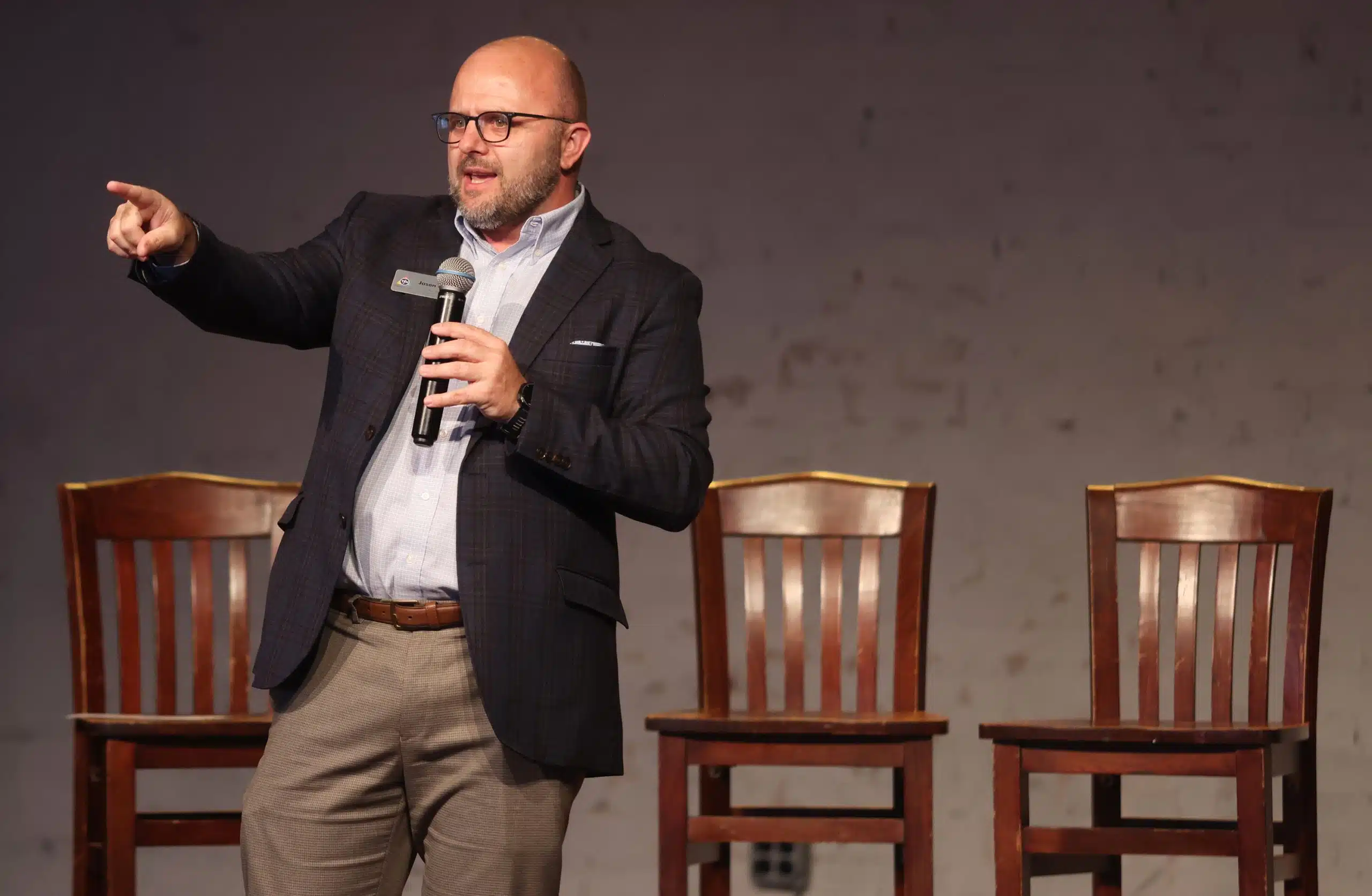
It felt more like church than a health summit at moments inside Duling Hall on Thursday.
The Better Health Summit, hosted by the poverty-focused nonprofit Together for Hope and the American Cancer Society Cancer Action Network, brought together faith leaders, medical experts and health care advocates in Fondren for one common cause: improving health care in Mississippi by expanding Medicaid.
Summit attendees, no matter their backgrounds, echoed versions of the same question: Why haven’t political leaders, in a majority-Christian state, seen Medicaid expansion as an issue of morality?
Though panels at the summit ranged from accessing community-based health care to retaining physicians in rural Mississippi, speakers framed the issues around Medicaid expansion, and how far the policy measure would go to improve the livelihoods of working-class Mississippians.
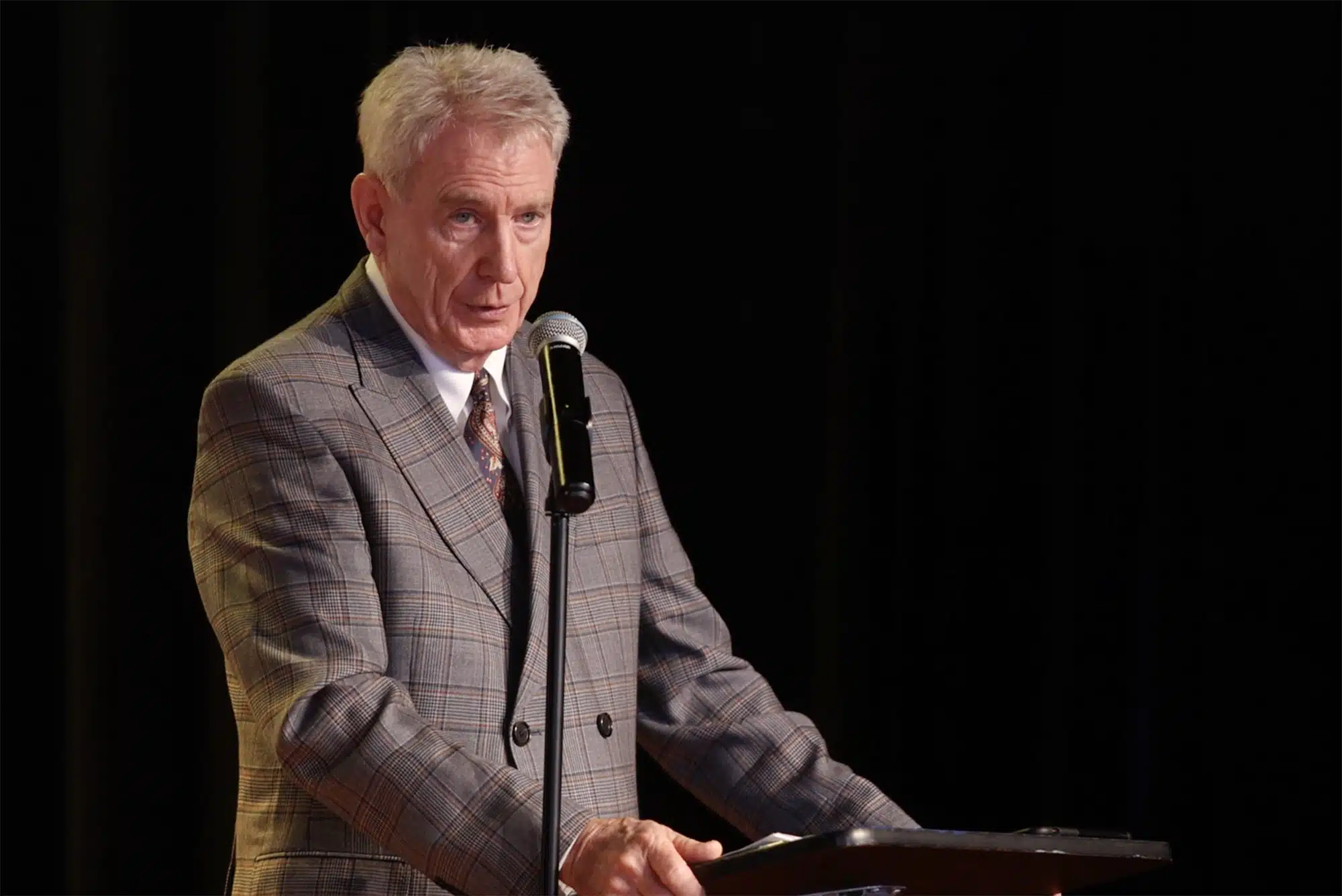
Dr. Dan Jones, the former president of the American Heart Association and former chancellor of the University of Mississippi and dean and professor emeritus at the University of Mississippi School of Medicine, spoke freely at the summit, finally without his ties to state institutions, he said.
He told stories from his stints in Iran, North Korea and South Korea as a medical missionary, and how it compared to the care he was able to provide under Mississippi’s health care system.
While abroad, when Jones diagnosed people with hypertension and diabetes, he knew they were going to be able to access long-term care and medications, he said.
In Mississippi, Jones had to tell a patient he’d need to get his leg amputated. The man, a logger, knew he’d had diabetes for three years but was unable to access health care because he couldn’t afford health insurance.
After the amputation, the logger, as a disabled person, finally became eligible for health insurance through Medicaid.
“In our country, you had to lose a leg before he had access to health care,” he said. “When I went home that night after seeing that patient, I was so frustrated … I said, ‘What an insane world we live in. Today, I told a man he was going to lose his leg for a condition that was absolutely 100% preventable. And it was our country, our state, who let him down and allowed that to happen to him.’”
He drew a contrast between those countries — where health care is generally considered a right, not a privilege — and Mississippi, a state where most of its residents are Christians, yet it took an amputation to get someone insured.
“It’s easy to think living where… people don’t have reasonable access to health care is okay, because it’s just the way it is,” he said. “It’s not.”
Jones echoed his faith and how he sees Medicaid expansion as a spiritual issue.
“I hope when I stand in the booth a few days from now that my first priority will not be what is going to be the economic impact on my family when I cast this vote,” he said. “I hope one of my thoughts is … are we going to do something that Jesus would approve of doing — to provide health care access to the most vulnerable in our community.
“It’s time for action.”
Medicaid expansion has remained a top issue in the upcoming election, perhaps most prevalently featured in the gubernatorial race.
Republican incumbent Gov. Tate Reeves has remained opposed to the policy change, reiterating his opposition as recently as last month, while Democratic challenger Brandon Presley has vowed repeatedly to expand Medicaid on his first day in office, if elected.
People in the faith community are increasingly calling for Medicaid expansion, including leaders at Reeves’ own church, which is hosting a series of lectures this weekend about how providing access to health care is a Christian value.
Mississippi is one of only 10 states that has not expanded Medicaid.
Research shows that over its first few years of implementation, expansion would bring in billions of dollars to Mississippi. That money is needed — the pandemic weakened an already-frail health care infrastructure, and now nearly half of the state’s rural hospitals are at risk of closure, partially due to money lost caring for uninsured patients.
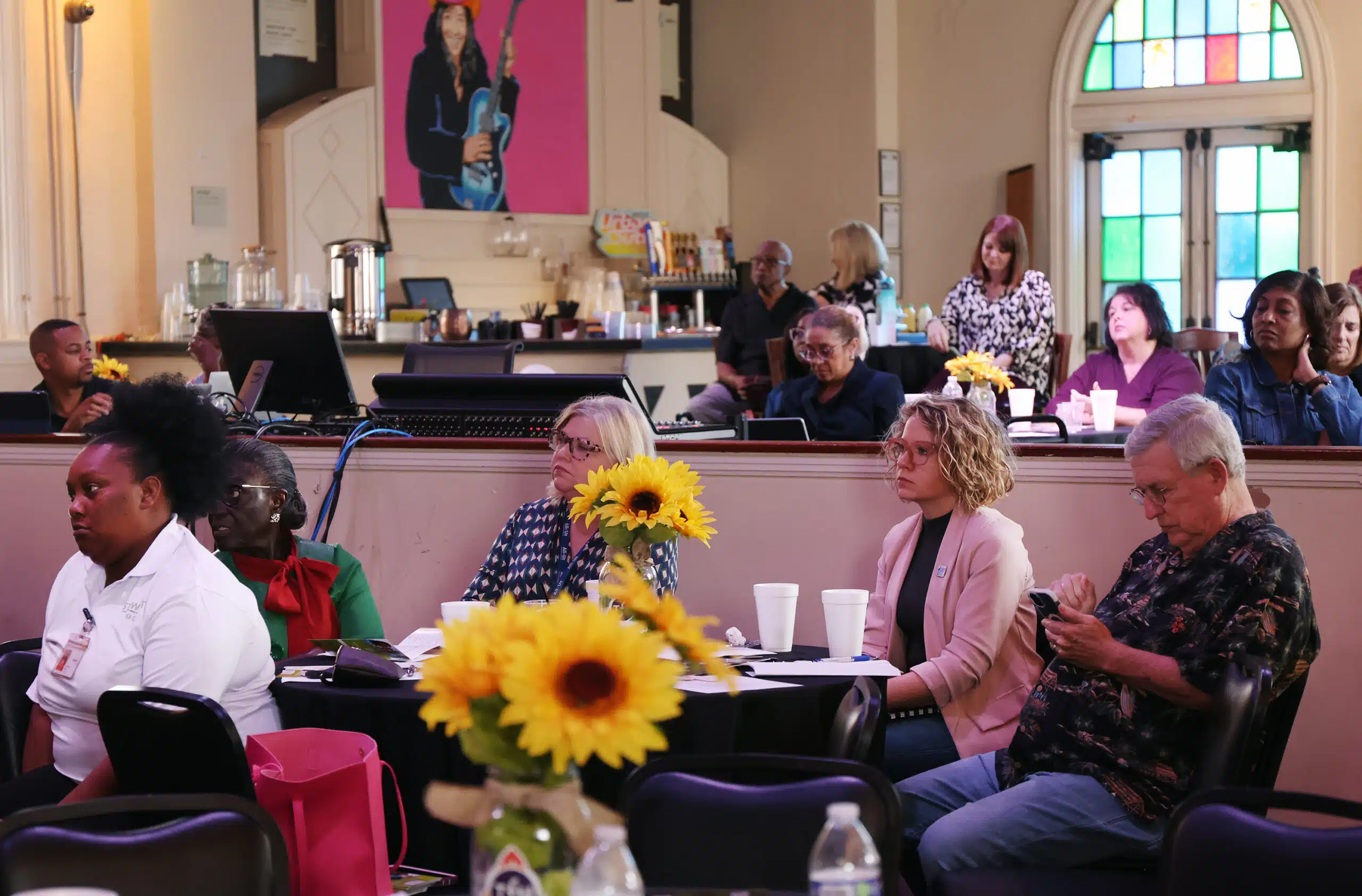
Kimberly Hughes, the American Cancer Society Cancer Action Network’s government relations director, stressed how critical insurance coverage is in the fight against cancer. Mississippi has one of the highest cancer mortality rates in the nation.
“Cancer is curable if it’s caught early, and it’s only caught early if it’s screened for, and screening requires appropriate health insurance,” she said.
Hughes described the types of Mississippians who expansion would cover — veterans, working parents and low-wage workers.
“Stop and think about people that you know, people that you love, people that are your neighbors that have no health insurance that could greatly benefit from it,” she said.
Rev. Jason Coker, a Baptist pastor and the president of Together for Hope, described his wife’s experience as a cancer survivor and wondered how other people could undergo the same thing without knowing they have access to treatment.
Though emergency rooms by law cannot turn down patients, other medical facilities can, making preventative treatment near-impossible to come by without health insurance.
“If we as the state of Mississippi are big Christians, super Baptist, if we can’t understand that as a moral issue, our religion is dead and worthless,” he said.
He described the connection between poverty and poor health outcomes, emphasizing the need for expansion.
According to Coker, 53 of the state’s 82 counties are in “persistent poverty,” and expansion would impact 200,000 to 300,000 Mississippians.
“People getting access to health care … We think that it is a moral obligation on our states to do that,” Coker said.
As Reeves and other state leaders who oppose expansion have derisively referred to Medicaid expansion as adding more people to “welfare rolls,” Coker warned Mississippians to take heed and reflect on themselves.
“So much of our politics in this day is bound up in that idea of who deserves state aid. Who deserves our help? You can only ask that question if you are standing in the seat of power,” Coker said. “We have elected officials in this state … who had the power to do something, and decided not to do it because they didn’t think someone else deserved it, or was worthy of it.
“And make no bones about it: That’s as deeply rooted in white superiority as anything that we know and our lived experience in the state of Mississippi. We call it racism. But it’s more than racism. It is white superiority.”
This article first appeared on Mississippi Today and is republished here under a Creative Commons license.
Mississippi Today
Trump nominates Baxter Kruger, Scott Leary for Mississippi U.S. attorney posts
President Donald Trump on Tuesday nominated Baxter Kruger to become Mississippi’s new U.S. attorney in the Southern District and Scott Leary to become U.S. attorney for the Northern District.
The two nominations will head to the U.S. Senate for consideration. If confirmed, the two will oversee federal criminal prosecutions and investigations in the state.
Kruger graduated from the Mississippi College School of Law in 2015 and was previously an assistant U.S. attorney for the Southern District. He is currently the director of the Mississippi Office of Homeland Security.
Sean Tindell, the Mississippi Department of Public Safety commissioner, oversees the state’s Homeland Security Office. He congratulated Kruger on social media and praised his leadership at the agency.
“Thank you for your outstanding leadership at the Mississippi Office of Homeland Security and for your dedicated service to our state,” Tindell wrote. “Your hard work and commitment have not gone unnoticed and this nomination is a testament to that!”
Leary graduated from the University of Mississippi School of Law, and he has been a federal prosecutor for most of his career.
He worked for the U.S. Attorney’s Office in the Western District of Tennessee in Memphis from 2002 to 2008. Afterward, he worked at the U.S. Attorney’s Office for the Northern District of Mississippi in Oxford, where he is currently employed.
Leary told Mississippi Today that he is honored to be nominated for the position, and he looks forward to the Senate confirmation process.
This article first appeared on Mississippi Today and is republished here under a Creative Commons Attribution-NoDerivatives 4.0 International License.
The post Trump nominates Baxter Kruger, Scott Leary for Mississippi U.S. attorney posts appeared first on mississippitoday.org
Note: The following A.I. based commentary is not part of the original article, reproduced above, but is offered in the hopes that it will promote greater media literacy and critical thinking, by making any potential bias more visible to the reader –Staff Editor.
Political Bias Rating: Centrist
This article presents a straightforward news report on President Donald Trump’s nominations of Baxter Kruger and Scott Leary for U.S. attorney positions in Mississippi. It focuses on factual details about their backgrounds, qualifications, and official responses without employing loaded language or framing that favors a particular ideological perspective. The tone is neutral, with quotes and descriptions that serve to inform rather than persuade. While it reports on a political appointment by a Republican president, the coverage remains balanced and refrains from editorializing, thus adhering to neutral, factual reporting.
Mississippi Today
Jackson’s performing arts venue Thalia Mara Hall is now open
After more than 10 months closed due to mold, asbestos and issues with the air conditioning system, Thalia Mara Hall has officially reopened.
Outgoing Mayor Chokwe A. Lumumba announced the reopening of Thalia Mara Hall during his final press conference held Monday on the arts venue’s steps.
“Today marks what we view as a full circle moment, rejoicing in the iconic space where community has come together for decades in the city of Jackson,” Lumumba said. “Thalia Mara has always been more than a venue. It has been a gathering place for people in the city of Jackson. From its first class ballet performances to gospel concerts, Thalia Mara Hall has been the backdrop for our city’s rich cultural history.”
Thalia Mara Hall closed last August after mold was found in parts of the building. The issues compounded from there, with malfunctioning HVAC systems and asbestos remediation. On June 6, the Mississippi State Fire Marshal’s Office announced that Thalia Mara Hall had finally passed inspection.
“We’re not only excited to have overcome many of the challenges that led to it being shuttered for a period of time,” Lumumba said. “We are hopeful for the future of this auditorium, that it may be able to provide a more up-to-date experience for residents, inviting shows that people are able to see across the world, bringing them here to Jackson. So this is an investment in the future.”
In total, Emad Al-Turk, a city contracted engineer and owner of Al-Turk Planning, estimates that $5 million in city and state funds went into bringing Thalia Mara Hall up to code.
The venue still has work to be completed, including reinstalling the fire curtain. The beam in which the fire curtain will be anchored has asbestos in it, so it will have to be remediated. In addition, a second air-conditioning chiller needs to be installed to properly cool the building. Until it’s installed, which could take months, Thalia Mara Hall will be operating at a lower seating capacity of about 800.
“Primarily because of the heat,” Al-Turk said. “The air conditioning would not be sufficient to actually accommodate the 2,000 people at full capacity, but starting in the fall, that should not be a problem.”
Al-Turk said the calendar is open for the city to begin booking events, though none have been scheduled for July.
“We’re very proud,” he said. “This took a little bit longer than what we anticipated, but we had probably seven or eight different contractors we had to coordinate with and all of them did a superb job to get us where we are today.”
This article first appeared on Mississippi Today and is republished here under a Creative Commons Attribution-NoDerivatives 4.0 International License.
The post Jackson’s performing arts venue Thalia Mara Hall is now open appeared first on mississippitoday.org
Note: The following A.I. based commentary is not part of the original article, reproduced above, but is offered in the hopes that it will promote greater media literacy and critical thinking, by making any potential bias more visible to the reader –Staff Editor.
Political Bias Rating: Centrist
The article presents a straightforward report on the reopening of Thalia Mara Hall in Jackson, focusing on facts and statements from city officials without promoting any ideological viewpoint. The tone is neutral and positive, emphasizing the community and cultural significance of the venue while detailing the challenges overcome during renovations. The coverage centers on public investment and future prospects, without partisan framing or editorializing. While quotes from Mayor Lumumba and a city engineer highlight optimism and civic pride, the article maintains balanced, factual reporting rather than advancing a political agenda.
Mississippi Today
‘Hurdles waiting in the shadows’: Lumumba reflects on challenges and triumphs on final day as Jackson mayor
On his last day as mayor of Jackson, Chokwe Antar Lumumba recounted accomplishments, praised his executive team and said he has no plans to seek office again.
He spoke during a press conference outside of the city’s Thalia Mara Hall, which was recently cleared for reopening after nearly a year of remediation. The briefing, meant to give media members a peek inside the downtown theater, marked one of Lumumba’s final forays as mayor.
Longtime state Sen. John Horhn — who defeated Lumumba in the Democratic primary runoff — will be inaugurated as mayor Tuesday, but Lumumba won’t be present. Not for any contentious reason, the 42-year-old mayor noted, but because he returns to his private law practice Tuesday.
“I’ve got to work now, y’all,” Lumumba said. “I’ve got a job.”
Thalia Mara Hall’s presumptive comeback was a fitting end for Lumumba, who pledged to make Jackson the most radical city in America but instead spent much of his eight years in office parrying one emergency after another. The auditorium was built in 1968 and closed nearly 11 months ago after workers found mold caused by a faulty HVAC system – on top of broken elevators, fire safety concerns and vandalism.
“This job is a fast-pitched sport,” Lumumba said. “There’s an abundance of challenges that have to be addressed, and it seems like the moment that you’ve gotten over one hurdle, there’s another one that is waiting in the shadows.”
Outside the theater Monday, Lumumba reflected on the high points of his leadership instead of the many crises — some seemingly self-inflicted — he faced as mayor.
He presided over the city during the coronavirus pandemic and the rise in crime it brought, but also the one-two punch of the 2021 and 2022 water crises, exacerbated by the city’s mismanagement of its water plants, and the 18-day pause in trash pickup spurred by Lumumba’s contentious negotiations with the city council in 2023.
Then in 2024, Lumumba was indicted alongside other city and county officials in a sweeping federal corruption probe targeting the proposed development of a hotel across from the city’s convention center, a project that has remained stalled in a 20-year saga of failed bids and political consternation.
Slated for trial next year, Lumumba has repeatedly maintained his innocence.
The city’s youngest mayor also brought some victories to Jackson, particularly in his first year in office. In 2017, he ended a furlough of city employees and worked with then-Gov. Phil Bryant to avoid a state takeover of Jackson Public Schools. In 2019, the city successfully sued German engineering firm Siemens and its local contractors for $89 million over botched work installing the city’s water-sewer billing infrastructure.
“I think that that was a pivotal moment to say that this city is going to hold people responsible for the work that they do,” Lumumba said.
Lumumba had more time than any other mayor to usher in the 1% sales tax, which residents approved in 2014 to fund infrastructure improvements.
“We paved 144 streets,” he said. “There are residents that still are waiting on their roads to be repaved. And you don’t really feel it until it’s your street that gets repaved, but that is a significant undertaking.”
And under his administration, crime has fallen dramatically recently, with homicides cut by a third and shootings cut in half in the last year.
Lumumba was first elected in 2017 after defeating Tony Yarber, a business-friendly mayor who faced his own scandals as mayor. A criminal justice attorney, Lumumba said he never planned to seek office until the stunning death of his father, Chokwe Lumumba Sr., eight months into his first term as mayor in 2014.
“I can say without reservation, and unequivocally, we remember where we started. We are in a much better position than we started,” Lumumba said.
Lumumba said he has sat down with Horhn in recent months, answered questions “as extensively as I could,” and promised to remain reachable to the new mayor.
This article first appeared on Mississippi Today and is republished here under a Creative Commons Attribution-NoDerivatives 4.0 International License.
The post 'Hurdles waiting in the shadows': Lumumba reflects on challenges and triumphs on final day as Jackson mayor appeared first on mississippitoday.org
Note: The following A.I. based commentary is not part of the original article, reproduced above, but is offered in the hopes that it will promote greater media literacy and critical thinking, by making any potential bias more visible to the reader –Staff Editor.
Political Bias Rating: Center-Left
The article reports on outgoing Jackson Mayor Chokwe Antar Lumumba’s reflections without overt editorializing but subtly frames his tenure within progressive contexts, emphasizing his self-described goal to make Jackson “the most radical city in America.” The piece highlights his accomplishments alongside challenges, including public crises and a federal indictment, maintaining a factual tone yet noting contentious moments like labor disputes and governance issues. While it avoids partisan rhetoric, the focus on social justice efforts, infrastructure investment, and crime reduction, as well as positive framing of Lumumba’s achievements, aligns with a center-left perspective that values progressive governance and accountability.
-
News from the South - Georgia News Feed6 days ago
Are you addicted to ‘fridge cigarettes’? Here’s what the Gen Z term means
-
News from the South - Oklahoma News Feed7 days ago
RFK Jr. Brings MAHA to Oklahoma
-
Local News7 days ago
St. Martin trio becomes the first females in Mississippi to sign Flag Football Scholarships
-
News from the South - South Carolina News Feed5 days ago
Federal investigation launched into Minnesota after transgender athlete leads team to championship
-
The Center Square4 days ago
U.S. Senate prepares for passage of One Big Beautiful Bill Act | National
-
News from the South - Tennessee News Feed5 days ago
Democratic resolution to block military action in Iran fails to advance in US Senate
-
News from the South - Virginia News Feed7 days ago
‘Hallowed ground, desecrated’: ICE sweeps at Chesterfield court draw fierce backlash
-
News from the South - Florida News Feed6 days ago
US Supreme Court allows SC to remove Planned Parenthood from list of Medicaid providers








